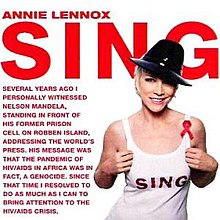
Ann Lennox is a Scottish singer-songwriter, political activist and philanthropist. After achieving moderate success in the late 1970s as part of the new wave band the Tourists, she and fellow musician Dave Stewart went on to achieve international success in the 1980s as Eurythmics. Appearing in the 1983 music video for "Sweet Dreams " with orange cropped hair and wearing a man's business suit, the BBC states, "all eyes were on Annie Lennox, the singer whose powerful androgynous look defied the male gaze". Subsequent hits with Eurythmics include "There Must Be an Angel ", "Love Is a Stranger" and "Here Comes the Rain Again".
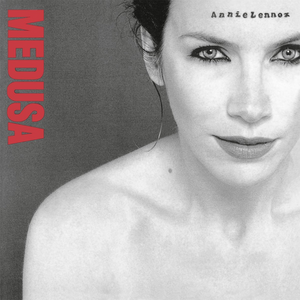
Medusa is the second solo studio album by Scottish singer Annie Lennox, released on 6 March 1995 by RCA Records. It consists entirely of cover songs. The album entered the UK Albums Chart at number one and peaked in the United States at number 11, spending 60 weeks on the Billboard 200. It has since achieved double platinum status in both the United Kingdom and the United States.
46664 was a series of AIDS benefit concerts played in honour of Nelson Mandela by South African and foreign musicians between 2003 and 2008.

"Why" is the debut solo single of Scottish singer-songwriter Annie Lennox, released on 16 March 1992. It was taken from her debut solo album, Diva (1992), and reached number five in the United Kingdom. In the United States, "Why" peaked at number 34 on the Billboard Hot 100 and number six on the Adult Contemporary chart. It was also a big hit internationally, reaching number one in Italy and peaking within the top 10 in Belgium, Canada, Ireland and five other countries. Its music video was directed by Sophie Muller. Stereogum ranked "Why" number one in their list of the 10 best Annie Lennox songs in 2015.

"Crazy for You" is a song recorded by American singer Madonna for the film Vision Quest (1985). It was released on March 2, 1985 by Geffen Records as the lead single from the film's soundtrack album. Film producers Jon Peters and Peter Guber, along with music director Phil Ramone, decided to use Madonna after listening to her previous recordings, employing John Bettis and Jon Lind to write the song. After reading the script of the film, Bettis and Lind wrote the song about the situation in which the lead characters meet at a nightclub. Initial recording sessions did not impress Bettis and Lind, and they felt that "Crazy for You" would be dropped from the soundtrack. However, a new version was recorded to their liking.

"The Voice Within" is a song by American singer Christina Aguilera from her fourth studio album, Stripped (2002). The song was written by Aguilera and Glen Ballard, with production handled by Ballard. It is a piano-driven ballad that talks about trusting oneself and one's instincts. "The Voice Within" was released as the fifth and final single from Stripped on October 27, 2003, by RCA Records.

"Like a Prayer" is a song by American singer Madonna from her 1989 fourth studio album of the same name. Sire Records released it as the album's lead single on March 3, 1989. Written and produced by Madonna and Patrick Leonard, the song heralded an artistic and personal approach to songwriting for Madonna, who believed that she needed to cater more to her adult audience. Thematically, "Like a Prayer" speaks about a passionate young girl in love with God, who becomes the only male figure in her life.

"Cherish" is a song by American singer Madonna from her fourth studio album, Like a Prayer (1989). It was written and produced by Madonna and Patrick Leonard, and was released by Sire Records as the album's third single on August 1, 1989. "Cherish" was built around the themes of love and relationships, with William Shakespeare's Romeo and Juliet being one of the major inspirations. The track also included a line from "Cherish" by the 1960s band the Association. Musically constructed as a doo-wop-style pop song, it is regarded as a light-hearted track by critics and includes instruments such as a drum machine, percussions, keyboards and a saxophone. Lyrically, it speaks of Madonna's devotion to her lover, and her promise to be always by his side. "Cherish" was included on Madonna's greatest hits compilations The Immaculate Collection (1990) and Celebration (2009).

"You'll See" is a song by American singer Madonna from her ballads compilation, Something to Remember (1995). The album was released with the intention of toning down the image of Madonna, who was being heavily criticized at the time. She wrote and produced the song with Canadian musician David Foster. "You'll See" was released on October 23, 1995, by Maverick Records as the lead single from the album. An acoustic pop ballad, "You'll See" features instrumentation from percussion, tremolo guitar and piano, while lyrically it speaks of independence after the end of a love affair.

Diva is the debut solo studio album by Scottish singer Annie Lennox, released on 6 April 1992 by RCA Records. The album entered the UK Albums Chart at number one and has since sold over 1.2 million copies in the UK alone, being certified quadruple platinum. In the United States, it reached number 23 on the Billboard 200 and has been certified double platinum. Diva won the Brit Award for British Album of the Year at the 1993 Brit Awards. The album received nominations for Album of the Year, Best Female Pop Vocal Performance and Best Long Form Music Video, winning the latter award at the Grammy Awards the same year.

"Santa Baby" is a song performed by American singer Eartha Kitt with Henri René and His Orchestra and originally released in 1953. The song was written by Joan Javits and Philip Springer, who also used the pseudonym Tony Springer in an attempt to speed up the song's publishing process. Lyrically, the song is a tongue-in-cheek look at a Christmas list addressed to Santa Claus by a woman who wants extravagant gifts such as sables, yachts, and decorations from Tiffany's.
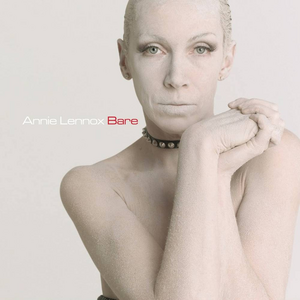
Bare is the third solo studio album by Scottish singer Annie Lennox, released in Europe on 5 June 2003 by 19 Recordings and RCA Records and in North America on 10 June 2003 by J Records. It peaked at number three on the UK Albums Chart and number four on the US Billboard 200. The album has been certified Gold in both the UK and the US and was nominated for Best Pop Vocal Album at the 46th Grammy Awards.

Shingai Elizabeth Maria Shoniwa, known professionally as Shingai is a Zimbabwean-British singer, songwriter, musician, and actress, best known as the vocalist and bassist for the English indie rock band Noisettes. In 2017, she launched her solo career and released her debut solo album in 2020.
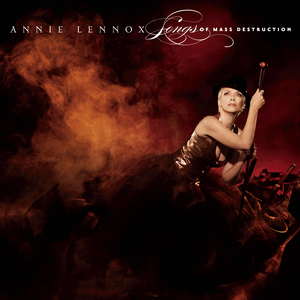
Songs of Mass Destruction is the fourth solo studio album by Scottish singer Annie Lennox, released on 1 October 2007 by RCA Records and 19 Recordings. It was her first album of new material since 2003's Bare and to date her most recent of original material.

"Precious" is a song by Scottish singer and songwriter Annie Lennox, released on 25 May 1992 as the second single from her debut solo album, Diva (1992). It peaked at number 23 in the UK and was a top 10 hit in Italy. The B-side, "Step by Step", was later covered by Whitney Houston for the soundtrack of her 1996 film, The Preacher's Wife, and became a top 10 hit. "Precious" is unrelated to the B-side track of the same name on the single "Revival" by Eurythmics.

"No More 'I Love You's'" is a song written by British musicians David Freeman and Joseph Hughes and originally recorded by them as the Lover Speaks. It was released in 1986 as the lead single from their self-titled debut album. The song was covered by the Scottish singer Annie Lennox and became a commercial success for her in 1995, reaching number two on the UK Singles Chart.

"The Greatest Hit" is a song by Norwegian singer Annie. It was written and produced by Annie and DJ Tore "Erot" Kroknes. The song samples Madonna's 1982 debut single "Everybody", and she received a co-writing credit. The track was released as a limited edition 7-inch single in 1999. It became an underground club hit in Norway and the United Kingdom. Retitled "Greatest Hit", the song was later included on Annie's debut album, Anniemal (2004).

The SING Campaign is a UK-based, non-governmental, nonprofit organization founded by artist/activist Annie Lennox which aims to raise funds and awareness for issues surrounding HIV/AIDS. The money raised by SING is used to help prevent the spread of HIV in South Africa, and also to support those currently living with HIV. Comic Relief manages the SING fund, and assists in co-ordinating the SING campaign.
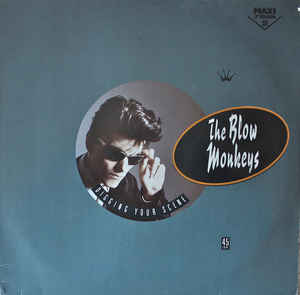
"Digging Your Scene" is a song recorded by English band the Blow Monkeys for their second studio album, Animal Magic (1986). The single was released in February 1986 as the second one from the parent record. It was written by lead singer Dr. Robert, while Howard, Peter Wilson, and Adam Moesley produced it. Musically a pop, soul, and jazz song, "Digging Your Scene" discusses the hatred and disgust that is associated with individuals who have HIV and AIDS. Several media professionals felt the song's subject matter would be the subject of criticism.
